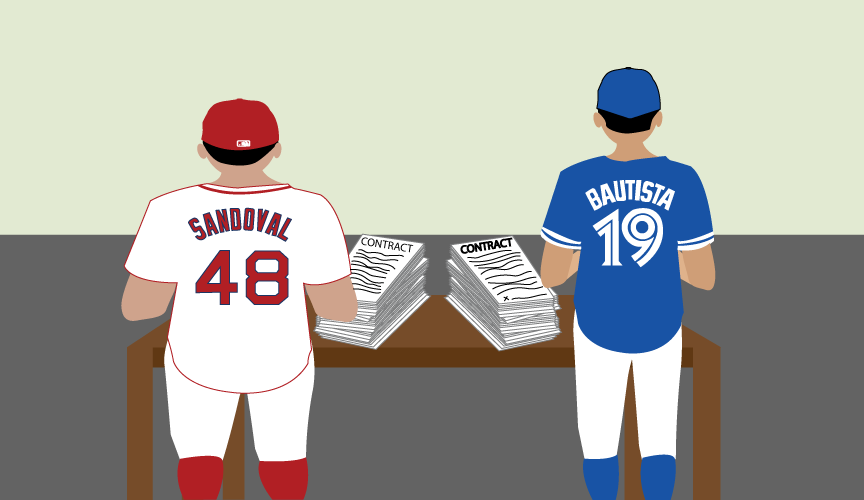
As you all are well aware, professional athletes make a ridiculous amount of money. It’s hard to feel bad for the underpaid stars — the guys who clamored at the first opportunity to be a multimillionaire and took what was so clearly laid out for them — but surprisingly, I actually do sometimes. The perfect example of why? Jose Bautista. After a monster season in 2010, in which he hit 54 home runs with 124 RBIs and a slashline of .260/.378/.617, Bautista cashed in by signing a five-year contract worth $65 million in guaranteed money with a club option that the Blue Jays exercised in a no-brainer decision. That amount of money is obviously nothing to scoff at, but position players of Bautista’s caliber are now making millions more in today’s market. Bautista’s “bargain contract” has resulted in his rigidity in his demands this time around. He is asking for a five-year, $150 million extension and he has publicly stated that he will not be negotiating. Either the Blue Jays meet those demands, or he is gone.
This is an immensely hefty price tag for a player turning 36 this season because these deals are incredibly perilous at this point in one’s MLB career. Barring a transcendent season from Bautista in 2016, I don’t see this extension happening, and with the recent track record of risky mega-deals throughout the MLB, I can’t blame the critics. Let’s take a look at some of the riskier contracts throughout the league in recent memory and see how they have paid off.
Pablo Sandoval, Boston Red Sox 5 years/ $95 million
Giants fans, take a deep sigh of relief. This former San Francisco postseason hero has had an atrocious start to his Red Sox career. In 126 games last year, Sandoval hit 10 homeruns with 47 RBIs and a .245/.292/.366 slashline. Sandoval finally lost his starting job this season, so it’s hard for the Red Sox front office to look at the remaining four years of his contract in a positive light. In addition to his horrid production, Sandoval is going to continue to cost the Red Sox additional money in the form of belt repairs; I have no doubt that those things will continue to snap like a bat over Bo Jackson’s knee every time he hacks at a pitch in the dirt.
Ryan Howard, Philadelphia Phillies 5 years/ $125 million
This one did not take long to hurt the Phillies. Howard signed this extension in 2010 after a sudden dip in production after four years of consistent dominance. While he does a great job endorsing Subway, Howard’s inability to stay on the field and get on base has made this one of the worst contracts in baseball history. Additionally, the Phillies made the mistake of extending him two whole years before his Free Agency, which was an incredibly poor decision in hindsight. Had they waited out his contract before renegotiating, there’s no chance Howard would have earned this one.
Hanley Ramirez, Boston Red Sox 4 years/ $88 million
The jury is still out on Hanley as he transitions to a new position at first base, but Hanley’s first season in a Red Sox uniform was so disastrous that his name has to be mentioned on this list. Hanley Ramirez was a horrible shortstop, but Hanley the shortstop is exponentially better than Hanley the left fielder. His defense was appalling — there is no way to sugarcoat it. Ramirez’s redeeming quality is his bat. The guy has an incredible amount of pop when he’s healthy, but that’s the issue: he rarely is. Injuries have taken a huge toll on Han-Ram over his lengthy career, so it wasn’t difficult to anticipate how this one was going to play out. Good luck at first base.
Melvin (B.J.?) Upton Jr., Atlanta Braves 5 years/ $72.5 million
This one was bad. Any time you decide to spend $72.5 million on a man who can’t even reach base 30 percent of the time, it’s not going to be pretty. After two seasons of failure in Atlanta, Melvin took his talents to the San Diego coast, and he can’t even find a starting job at this point. It’s only a matter of time before he gets traded to the Tigers so he can hang out with his superstar brother in the locker room and talk about the good old days. By the way, that superstar brother, Justin Upton, has hilariously made less money to date than Melvin, and I know that’s eating him away on the inside.
These contracts may not necessarily be the biggest in baseball, but they are definitely some of the riskiest. Whether it’s related to health, age or overpaying for postseason play, these contracts, when first signed, raised eyebrows throughout the baseball world. Risky deals rarely work out, so I anticipate that Bautista and other risky investments will at least be a little bit disappointed when Signing Day arrives. The lack of overly-paid players in the most recent World Series between the Royals and Mets shows that this is not the recipe for winning; these risky signings should be avoided wherever and whenever possible, and the savings should instead be devoted to more reliable investments.
Written by: Michael Wexler – sports@theaggie.org



